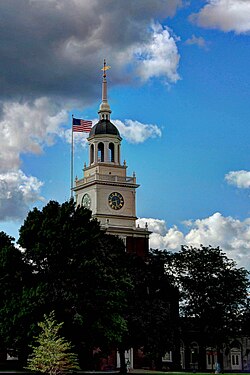Henry Ford Museum
|
Edison Institute
|
|

|
|
| Location | The Henry Ford 20900 Oakwood Boulevard at Village Road Dearborn, Michigan United States |
|---|---|
| Coordinates | 42°18′12.90″N 83°14′2.68″W / 42.3035833°N 83.2340778°WCoordinates: 42°18′12.90″N 83°14′2.68″W / 42.3035833°N 83.2340778°W |
| Built | 1929 |
| Architect | Robert O. Derrick |
| NRHP Reference # | 69000071 |
| Significant dates | |
| Added to NRHP | December 21, 1981 |
| Designated NHLD | December 21, 1981 |
The Henry Ford (also known as the Henry Ford Museum and Greenfield Village, and more formally as the Edison Institute) is a large indoor and outdoor history museum complex and a National Historic Landmark in the Detroit suburb of Dearborn, Michigan, USA. The museum collection contains the presidential limousine of John F. Kennedy, Abraham Lincoln's chair from Ford's Theatre, Thomas Edison's laboratory, the Wright Brothers' bicycle shop, the Rosa Parks bus, and many more historical exhibits. The Henry Ford Museum and Greenfield Village is the largest indoor-outdoor museum complex in the United States and is visited by 1.6 million people each year.
Named for its founder, the automobile industrialist Henry Ford, and based on his efforts to preserve items of historical interest and portray the Industrial Revolution, the property houses homes, machinery, exhibits, and Americana of historically significant items as well as common memorabilia, both of which help to capture the history of life in early America.
Henry Ford said of his museum:
I am collecting the history of our people as written into things their hands made and used.... When we are through, we shall have reproduced American life as lived, and that, I think, is the best way of preserving at least a part of our history and tradition...
The Edison Institute was dedicated by President Herbert Hoover to Ford's longtime friend Thomas Edison on October 21, 1929 – the 50th anniversary of the first successful incandescent light bulb. The attendees included Marie Curie, George Eastman, John D. Rockefeller, Will Rogers, Orville Wright, and about 250 others. The dedication was broadcast on radio with listeners encouraged to turn off their electric lights until the switch was flipped at the Museum.
...
Wikipedia



